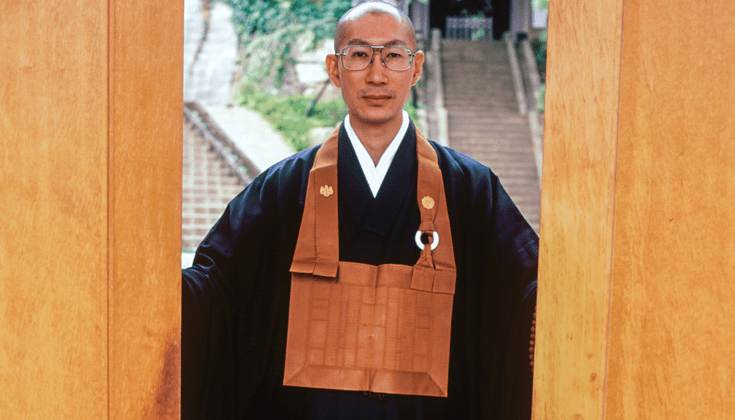The Buddhist precepts help us to determine right and wrong. Some of my Christian friends wonder how non-Christians can live moral lives without accepting the Christian commandments. They presuppose that Christian morality is the only acceptable morality and that other traditions do not have guidelines for moral behavior.
Currently, I am studying the Buddhist precepts in my Zen practice. In some ways, the Buddhist precepts are similar to the Judeo-Christian Ten Commandments. In other ways, they are not. For example, some Christians believe that “sin” is universal, but it is not. A sin is a transgression against divine law. But, billions of people do NOT believe in a law-giving personal God.
Morality is universal. So, whether one believes in divine law or not, virtually all sacred and secular communities are concerned about morality, the difference between right and wrong.

The Sixteen Bodhisattva Precepts are an essential part of Zen practice. The San Francisco Zen Center provides the following translation of the precepts:
Three Refuges
I take refuge in Buddha before all beings, immersing body and mind deeply in the Way, awakening true mind.
I take refuge in Dharma before all beings, entering deeply the merciful ocean of Buddha’s Way. (Note: Dharma generally refers to the teachings or truth which describe righteous living.)
I take refuge in Sangha before all beings, bringing harmony to everyone, free from hindrance. (Note: Sangha generally refers to the community of practitioners or the wider community.)
Three Pure Precepts
I vow to refrain from all evil.
I vow to make every effort to live in enlightenment.
I vow to live and be lived for the benefit of all beings.
Ten Grave Precepts
I vow not to kill.
I vow not to take what is not given.
I vow not to misuse sexuality.
I vow to refrain from false speech.
I vow to refrain from intoxicants.
I vow not to slander.
I vow not to praise self at the expense of others.
I vow not to be avaricious.
I vow not to harbor ill will.
I vow not to disparage the Three Treasures.
These vows are expressed in a jukai ceremony where students express repentance and receive the precepts. Typically, they also receive a dharma name, a lineage chart, and a small robe.
My school, the Sanbo Zen lineage, combines the focus of the Soto Zen school and the Rinzai Zen school. Soto emphasizes meditation or zazen. Rinzai emphasizes both koan study and zazen. In the Soto, practitioners study the precepts at the beginning of their practice. In the Rinzai, practitioners study them at the end of koan curriculum, which can take many years to complete.
To me, it makes sense to study the precepts at the beginning, so that those who are new to the practice can consider the practical implications of living a life of compassion and wisdom.
Reflections on Precept Study
Often, the precepts are studied in a group of ten or twenty people, who break into smaller groups of two or three people for in-depth discussions. These groups, like the sangha, are diverse. Thus, students can benefit from the insights that other students provide. Also, the community grows closer as its members engage in this deep sharing.
The precepts are commonly interpreted broadly, so that (for instance) the prohibition against killing also includes hurting, “killing” time and wasting resources, not only taking a life. Also, many Buddhists interpret the precepts to apply to all sentient beings, not just human beings. So, the precepts discourage some actions that the Christian commandments seem to permit.
When we discuss the precepts using real-life examples, we see that moral precepts are more than absolute rules or iron-clad standards for individual spiritual self-improvement. Rather, precepts are practiced in the community, and the measure of whether we are helping or hurting has as much (or more) to do with how we impact others than with how we impact ourselves.
Also, in real life, we consider our motivations, as well as our outcomes, when determining whether we are helping or hurting. So, when we consider how we treat others and how they treat us, we establish boundaries that require discerning what we intend by our actions and what we think they intend by their actions.
The Buddhist Precepts Help Us to Determine Right and Wrong
Consider the commandments and precepts concerning sexuality. The Judeo-Christian tradition commands, “Thou shalt not commit adultery,” and “Thou shalt not covet thy neighbor’s house, thou shalt not covet thy neighbor’s wife, nor his manservant, nor his maidservant, nor his ox, nor his ass, nor any thing that is thy neighbor’s.”
(Arguably, the tenth commandment, excerpted here from the King James Version, is more about patriarchy and property rights, as practiced in Biblical times, than about sexuality.)
The Buddhist tradition asks us to affirm, “I vow not to misuse sexuality.” Like all of the precepts, this is expressed as a commitment by the practitioner, not as a commandment from God.
Imagine that a husband and wife engage in non-consensual sex within their marriage. Have they violated the Judeo-Christian commandments? Have they violated the Buddhist precepts? Imagine that two single people engage in a consensual, safe one-night stand. Have they violated the Judeo-Christian commandments? Have they violated the Buddhist precepts?
When you engage with these questions, then you can appreciate that the Buddhist precepts help us to determine right and wrong.
If you want to keep up with the latest from You Might Be Right, please subscribe.
The Way received a 2024 Nautilus Book Award.
If you enjoyed this article, please leave a comment at the bottom of this page.
Thanks for reading You Might Be Right!!














